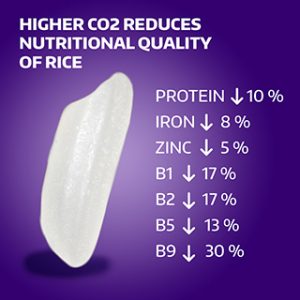Rice Less Nutritious as CO2 Levels Rise – New Study Published
A study published today in Science Advances shows for the first time that rice grown at concentrations of atmospheric CO2 expected by the end of this century has lower levels of four key B vitamins. The findings from an international research team analyzed rice samples from field experiments started by a University of Tokyo professor. It includes UW Nutritional Sciences Program Director Adam Drewnowski as a co-author and has received global news coverage. Results also support research from other field studies showing rice grown under higher CO2 concentrations has less protein, iron and zinc.

Rice is the primary source of food for more than 2 billion people. Decreases in the nutritional content of rice could have a disproportionate impact on health outcomes in the poorest rice-dependent countries, according to the team, which includes researchers from the University of Washington schools of public health and medicine.
Selected News Articles:
Increasing CO2 levels reduce rice’s nutritional value
UW Medicine Newsroom, May 23, 2018
Rice becomes less nutritious as CO2 levels rise
Eureka Alert, May 23, 2018
Media Contact: University of Washington School of Public Health – Jeff Hodson: jeffhod@uw.edu, 206.685.8904
May 23, 2018